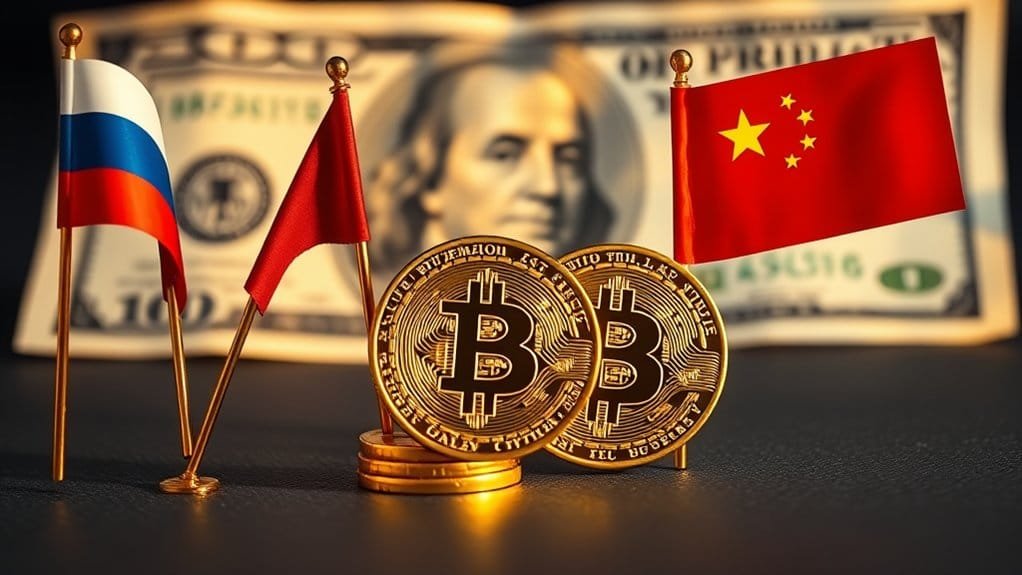China and Russia are quietly embracing Bitcoin despite public crypto criticism. They’re using it to dodge Western sanctions and ditch the dollar system altogether. No SWIFT needed, no American banks required. Russia legalized crypto for international trade while China makes backdoor energy deals with Moscow using Bitcoin. It’s not just speculation anymore—it’s actual oil trade happening outside dollar dominance. The financial rebellion is bigger than most realize.

While the United States maintains its grip on global finance, China and Russia are quietly making moves to break free using an unlikely tool: Bitcoin. These two powers aren’t exactly cryptocurrency enthusiasts at home—China banned crypto mining, remember?—but they’ve found Bitcoin surprisingly useful for dodging American influence abroad.
It’s about sanctions, really. Russia’s been boxed in since 2022, and Bitcoin offers a way out. No SWIFT system needed. No American banks asking questions. Just digital transactions flowing between willing partners. China’s playing along, settling energy deals with Russia using the very cryptocurrency their citizens aren’t supposed to touch. Ironic, isn’t it? What Is Bitcoin?
Sanctions drove enemies into Bitcoin’s arms—the very tool they publicly condemn becoming their financial escape hatch.
The strategy fits neatly into broader BRICS ambitions. De-dollarization isn’t just a clunky economic term anymore—it’s an active policy. Bitcoin, once dismissed as internet money for speculators, now facilitates real oil trades. Actual barrels of crude, paid for with digital coins. Who would’ve thought?
Russia’s even changed its laws to make cryptocurrency legal for international payments. They’re serious about this. Meanwhile, Chinese officials keep criticizing crypto publicly while quietly supporting these backdoor arrangements that undermine dollar dominance.
This shift isn’t happening in isolation. Global trade tensions have pushed countries to seek alternatives. The dollar’s still king, sure, but its crown is wobbling. Foreign investors are actively divesting from US assets amid economic instability concerns. Nations are hedging their bets. Bitcoin offers something unique—a financial network no single country controls.
Energy transactions are just the beginning. Every Bitcoin trade between these powers represents a tiny declaration of independence from Western financial systems. A digital rebellion of sorts. The rapidly growing capacity of Russian mining companies has further enabled this transition away from traditional financial channels.
For Bitcoin itself, this means a change from speculative asset to practical financial tool. Not just for basement-dwelling crypto bros anymore. Now it’s helping superpowers conduct international trade on their own terms.
The message is clear: America’s financial weapons have created unexpected consequences. The more the U.S. utilizes dollar power, the more incentive others have to find workarounds. Bitcoin just happens to be a convenient solution. No permission required.
Frequently Asked Questions
How Does Bitcoin’s Volatility Impact Its Use as a Reserve Currency?
Bitcoin’s volatility presents major obstacles for reserve currency status.
Price swings—sometimes 10x higher than traditional currencies—undermine its reliability for central banks. They need stability, not assets that can tank 60% in months.
Liquidity issues? Big time. Try managing monetary policy with something this unpredictable.
Plus, without government backing, it lacks credibility. Countries like Russia have already said “no thanks” to volatile Bitcoin reserves.
What Legal Challenges Do Nations Face When Adopting Cryptocurrency Officially?
Nations adopting cryptocurrency face a legal minefield.
Classification issues are a nightmare—is it money, property, or something else? Tax structures aren’t built for digital assets. AML/KYC compliance becomes a bureaucratic headache.
International law? Good luck with that. Cross-border transactions blur jurisdictional lines, making enforcement nearly impossible.
Consumer protection remains sketchy at best. And let’s not forget—existing financial treaties weren’t designed with Bitcoin in mind.
Regulatory clarity? Still waiting.
How Could Western Sanctions Influence Cryptocurrency Adoption by These Countries?
Western sanctions are practically gift-wrapping cryptocurrency adoption for targeted nations. When you can’t use SWIFT or dollars, Bitcoin suddenly looks pretty appealing.
Russia’s actively legalizing crypto for international trade while keeping domestic use restricted. Smart move. Countries like Iran and Venezuela are following suit.
Sanctions designed to isolate these economies are instead pushing them toward decentralized alternatives. Talk about unintended consequences. The more pressure applied, the faster they’ll innovate around traditional systems.
Can Bitcoin Truly Replace SWIFT for International Settlements?
Bitcoin could technically replace SWIFT, but it’s not that simple.
Speed? Bitcoin wins. Costs? Lower with Bitcoin.
But SWIFT’s entrenched everywhere—11,000 institutions deep. Bitcoin’s volatility is a nightmare for businesses.
Try explaining to your boss why that million-dollar payment is suddenly worth $800,000.
Regulatory obstacles remain massive too.
Reality check: adoption would require a fundamental overhaul of global financial infrastructure. Not happening overnight, folks.
What Technological Infrastructure Is Needed for National Bitcoin Adoption?
National Bitcoin adoption requires serious tech backbone.
Reliable electricity and internet access are non-negotiable. Countries need secure networks, strong cybersecurity, and widespread smartphones.
Digital wallets and payment systems must be integrated with existing financial infrastructure. Reliable currency conversion tools are crucial.
And honestly? Thorough public education programs. Can’t have grandma losing her savings because she can’t figure out her private keys.

